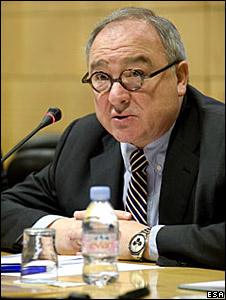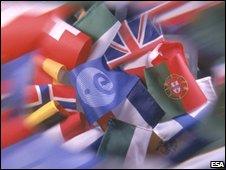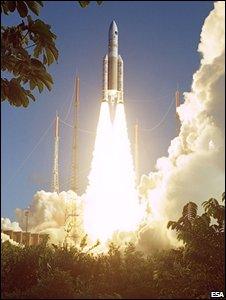Esa chief Jean-Jacques Dordain set to continue in role
- Published

The current Esa director general has been in post since 2003
Jean-Jacques Dordain, the boss of the European Space Agency (Esa), could be heading for another period in office.
It is understood both Germany and France, the organisation's leading member-states, are proposing he should carry on in the post beyond 2010.
The Frenchman assumed the role of director general in 2003, and is coming to the end of his second term.
During his time at the helm, Esa has launched a swathe of Earth observation spacecraft and interplanetary probes.
The agency has launched many important space astronomy and human spaceflight missions, also.
This year, the organisation is expected to spend more than 3.5bn euros on European space activity.
It was thought a German national would succeed Mr Dordain, but one of the leading candidates - the current chairman of the German space agency (DLR) - announced on Monday he did not want to be considered for the role.
Writing on his blog, Professor Jan Woerner said he was very happy in his position at DLR and had unfinished work there.

Esa now numbers 18 member-states and is set to grow still further
He said: "Following my personal decision, the German federal government and our neighbour, France, have jointly proposed that Jean-Jacques Dordain should remain as director general for a further period of office. This proposal has been accepted by the other member states."
To be confirmed for another period in office, Mr Dordain will have to receive the backing of other Esa members - not just Germany and France. This decision could come as early as this month when the agency's council meets at Esa's Paris headquarters.
If Mr Dordain stays as DG, it will ensure a backbone of continuity at the agency as a number of senior directors are expected shortly to stand down from their positions.

Space activity has been affected by the downturn, also
Professor Woerner said Germany would be proposing candidates for these core positions as they became available.
The European Space Agency was set up in 1975 and now has 18 full members and a number of co-operating states that includes Canada.
Germany this year will fund almost 17% of Esa's budget; France will account for 18%. The other leading nations financially are Italy (9.9%), the UK (6.8%), Spain (5.2%) and Belgium (4.3%).
The next DG will have the difficult task of continuing to steer the agency through the global economic trough. He will also have to manage the developing relationship with the European Union. Under its Lisbon Treaty, the EU claims "joint competency" with its member states on space policy.
Esa and the EU have different legal frameworks and their memberships are not a facsimile of each other.